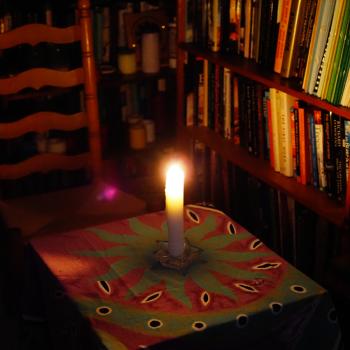Editor's Note: This article is part of the symposium, "What Is Progressive Christianity?" presented by the newly launched Patheos Progressive Christian Portal.
I consider myself a progressive Christian, but not without some caveats. I worry about the oppositional character that often attends all such identity labels, as if to be something one must take a stand against something else. I am also troubled when "progressive" functions as a synonym for "liberal," which for some implies the rejection of tradition, or that "progress" renders new things by definition better than old ones.
I mitigate my reticence about progressive Christianity by drawing on the kinds of social analysis that have appeared under the banner of queer theory over the last twenty years. "Queer," however, is not merely a shorthand way to refer to lesbian, gay, bisexual, and transgender (LGBT) people. Queer theorists instead interrogate the classification schemes of the modern West that produced those categorical sexual and gender identities in the first place. They do this, in part, by analyzing cultural systems of institutional power and who benefits from the categorical identities created by those systems—whether political, legal, medical, or religious. This power/benefit analysis prompts a deep suspicion toward nearly all dichotomous classifications (the binary gender system being the paradigm case).
In the hands of theologians, queer theory provides a tool for analyzing the extent to which contemporary Christianity has been shaped, for good or for ill, by the assumptions of modern Western culture. Institutional Christianity is certainly no less vulnerable to the vexations of binary classifications than any other cultural system (some queer theorists would argue that Christianity actually exemplifies and perpetuates those vexations). In the struggle for LGBT inclusion, for example, we might attend a bit more carefully to the particularly modern cultural assumptions that made that movement necessary and this could, in the process, prove transformative for the whole Church and not just for LGBT-identified people. At the very least, and more broadly, queer theorizing for theology does not automatically assume that modern sensibilities are superior to ancient ones.
That kind of theological analysis rather quickly blurs the distinctions between "conservative" and "liberal" and creates space for a "progressive" posture. For me, that posture takes the historical traditions of Christianity more, not less seriously as a way to disrupt and interrupt modernity's assumptions about religion generally and Christianity in particular. Not least, it disrupts the contrived separation between religion and politics, as if these described separate worlds rather than a single sphere of divine encounter. It also interrupts the typically liberal suspicion of the Bible, which tends to consign biblical texts without remainder to a world we no longer inhabit. That suspicion often fails to grasp the spiritual power of Scripture to change lives and inspire visions of the realm of God sufficient to energize social transformation. That posture likewise interrupts the generally conservative portrayal of Christian tradition as monolithic, or the insistence on remaining faithful to an "unbroken chain of tradition." Engaging with the rich and varied voices in Christian history will not fit easily into a single system, much less a single "orthodoxy." I would describe all of this as a queerly progressive approach to Christianity in which biblical and historical insights are not just retrieved uncritically, nor simply abandoned as antiquated, but are instead refashioned in a shared project of human and planetary thriving—shared, that is, by more than just self-identified Christians.
More simply, what purpose are the Bible and the Church supposed to serve? Breaking the conservative/liberal stalemate over that question might begin with the proposal made by biblical scholar Dale Martin as he urges Christians to reclaim the Bible as the "Church's book." The Church, after all, does not exist to serve the Bible. The books of the Bible were assembled by the Church and for the Church's mission, and this in turn prompts reflection on what exactly that mission is. Biblical writers themselves might offer suggestions, especially when they insist that religion does not exist for itself but to bear witness to God's own mission in the world, a mission marked by healing, peace, justice, renewal, reconciliation, or more simply and broadly, "abundant life" (John 10:10).




